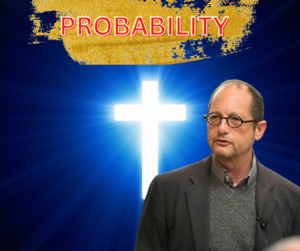 Peace of Christ Mr.Minton. I have just finished the conclusion of your 12 part video series. And a question came to my mind so here we go.
Peace of Christ Mr.Minton. I have just finished the conclusion of your 12 part video series. And a question came to my mind so here we go.
Q:How do we get from the Resurrection to all of Christainity?
A(As said in your video): If Jesus rose from the dead then God put his stamp of approval on everything Jesus said and did. Including his claim to be divine. God would never raise a heretic and a blasphemer. But given the fact that God did raise Jesus from the dead, then God implicitly put his stamp of approval on everything Jesus said and did. God agreed with Jesus’s claims, such as his claim to be divine.
However there are two objections to this that I know of.
1. How do we know that it was God who raised Jesus? (You covered this in a prior blog post) it could be a demon. It could be a trickster god trying to cause havoc. It could be a wizard or witch. It could be phoenix feathers or a philosopher’s stone. Any number of supernatural entities could have raised Jesus from the dead and Christianity still wouldn’t be true.
2. If it was God, how can we know God’s intentions? How do we know it was God’s intention to raise Jesus from the dead as a way to confirm his message? God could have completely different intentions beyond our comprehension for raising Jesus aside from confirming his message.
How would you respond to this?
- Andro
 I’m glad you watched the whole series, Andro, and I would encourage everyone who reads this article do the same. Click here to watch it in its entirety. The video series goes in depth into the historical evidence for Jesus Christ’s resurrection from the dead.
I’m glad you watched the whole series, Andro, and I would encourage everyone who reads this article do the same. Click here to watch it in its entirety. The video series goes in depth into the historical evidence for Jesus Christ’s resurrection from the dead.
1: How Can We Know It Was God Who Raised Jesus?
Now, your first question as it pertains to the validation of the Christian worldview is that, having granted that the best explanation for the minimal facts is that Jesus rose from the dead, how can we know it wasn’t some supernatural entity other than the God of Israel wasn’t responsible? The article you referred to in which I refute the idea that demons could be behind it was titled “Was It God Who Raised Jesus From The Dead?”
I am unsure why what I said in that article didn’t satisfy the argument for you. But let me offer a different response regarding non-demonic entities. We may not be able to rule out a “Philosopher’s Stone”, “Phoenix Feathers”, or a “trickster god” with Cartesian Certainty. Nevertheless, we need to remember that just because something may be possible, that doesn’t mean it’s reasonable. Many things are possible, but not all things are equally reasonable.
Say you’re a detective who comes upon a dead body scene. You’ve looked at the evidence at the scene and determined that of the four possible explanations for the person’s death – i.e an accident, natural causes, suicide, or homicide – only the last explanation can account for all of the facts (i.e the pool of blood coming out from underneath them, the multiple knife wounds in their back, the knife sticking out of their back, and the bloody footprints leading away from the corpse). Now the only question is “WHO killed this person?” I’m betting that as a detective, you would probably just stick to persons who had a reasonable chance of being the killer. You most likely wouldn’t consider people who lived in other countries and had never even met the victim, or persons who would have absolutely no motives. You would probably also assume that the murderer was a human being who is currently alive and not a zombie, ghost, or demon. You wouldn’t probably take into account the possibility that an alien had come down in a flying saucer, stabbed the guy in the back, and then zipped away before any eyewitnesses could even get a blurry low resolution photo of the UFO!
Now, all of these are certainly possible. I’m totally open to the possibility of aliens being real and being capable of intergalactic travel. As a Christian, I believe demons and ghosts exist. But based on what I know, I know that most murders are caused by other humans. Accounts of demonic activity have AT MOST, some non-lethal form of bodily harm (e.g scratch marks mysteriously appearing on their backs, or maybe some illness like boils or sores). And most testmony of extra-terrestrial activity usually involves crop circles, abductions, but never a murder. At least to my knowledge.
Yeah, it’s possible that a non-human entity is the killer, but why assume otherwise unless we have some good evidence?
By contrast, let’s say the victim knew a man named Richard, and Richard was known to have a bad temper. On the night of the murder, people reported hearing the victim and Richard shouting at each other. Eyewitnesses saw a man of a similar build to Richard leaving the home, and detectives found a pair of pants at Richard’s home that had been chemically spot cleaned. Based on this and perhaps some other evidence, you’d be less justified in concluding anyone other than Richard murdered the suspect, especially a non-human murderer.
Jesus claimed to know and follow the God of Israel. He taught His disciples to pray to the Father. As a rabbi, Jesus believed and taught that the Old Testament was divinely inspired. As I said in part 12 of my The Case For The Resurrection Of Jesus video series, we don’t even need to apply the criteria of authenticity to certain portions of the gospels to conclude these facts. Just the sheer fact that Jesus was a Jewish man living in Israel meant that he probably knew and believed Torah, and being a Jewish Rabbi makes it even more certain. This gives us a “religio-historical background” to the resurrection. In other words, the resurrection happened in a specific context. It was not a freak event that happened in isolation. Why should we think that anyone other than the God Jesus claimed to follow was the one who raised him?
It seems to me prima facie more plausible to suspect Yahweh of being the cause of Jesus’ resurrection than some force like a philosopher’s stone of phoenix feathers, which we don’t even have evidence exists! We DO have good evidence that an entity like the God described in the Hebrew scriptures exists. We have The Kalam Cosmological Argument, The Cosmic Fine-Tuning Argument, The Local Fine-Tuning Argument, The Moral Argument, and The Ontological Argument. And as I point out in my book “The Case For The One True God”, no god except the God of Israel matches the description of the God these arguments show exists. Only the Abrahamic religions have a God that creates the universe ex nihilo for example. All other religions have a god or gods that create within an eternally existing space-time realm. They just bring order to eternally existing matter and energy. And only Yahweh matches the description of The Maximally Great Being proven to exist by The Ontological Argument. You can get the book for more details. So we don’t have evidence for phoenix feathers and philosophers stones, we do have good evidence for the Abrahamic God, so wouldn’t it make more sense to consider the latter instead of the former? Sure, the former are possible, but the latter is more reasonable.
This is another reason why combining Natural Theology with the historical evidence for the resurrection is a good idea. Not only does it help with the Antecdent Probability objection naturalists raise (which I talk about in video No. 9 in the series), but when combined with the Divine Identity Argument talked about in the aforementioned book, it also means that we know with a reasonable amount of probability that the God of Israel was involved in the event rather than just any supernatural entity one might conjure up. “It was Agatha all along!”
2: If It Was God, How Can We Know God’s Intentions?
I do think God had multiple reasons for raising Jesus, confirming he message was only one of them (see Matthew 16:1-4). One reason was to commission the disciples (John 20:19-23). Jesus had to rise to tell the disciples what to do and where to go. Moreover, the resurrection was part of Jesus’ salvific work for us. The Bible teaches that it wasn’t just Jesus’ death that saves us from our sins, his resurrection saves us as well. Romans 4:25 says “He was delivered over to death for our sins and was raised to life for our justification.” Both the death and resurrection were two sides of the salvific coin. Jesus is “the firstfruits of those who have fallen asleep” (1 Corinthians 15:20). God also wanted to raise Jesus to fulfill prophecy. Jesus prophesied His resurrection (Mark 8:31), and so did the Old Testament (Psalm 16:10–11; Isaiah 53:12).
Could there be even more reasons for God to have raised Jesus? Possibly. But I see no reason to doubt that God has the above reasons. It would seem to me to be hyper-skepticism to doubt these.
My argument for God’s stamp of approval on Jesus’ ministry primarily comes from the fact that if Jesus weren’t God, yet He claimed to be, then God would be raising a heretic and a blasphemer. God knew that if He raised Jesus, the disciples would believe Him, so would 5000 people at Pentecost (see the book of Acts), and that Christianity would become one of the largest religions in the world, rivaling Judaism. If unitarian Judaism were the true religion, if Jesus isn’t the messiah, never mind God, then God did a pretty stupid thing by raising Jesus.
Would a good God do that knowing that many souls would be drawn into idolatry and end up in Hell on judgment day? This God, who claimed in the books of Isaiah and Psalms to want to draw the nations to himself (who he disinherited at Babel – see Genesis 11 and Deuteronomy 32:8-9) would lead those nations astray by raising Jesus from the dead, which He knew would propel the Christian movement?
It seems to me that Yahweh would leave Jesus in the grave is Jesus wasn’t who he claimed to be. Good riddance to heretical rubbish. However, since Yahweh didn’t leave Jesus in the grave, that implies that He wanted people to follow him. He wanted the Christian movement to get off the ground? Why? Because as he said to the apostles at the transfiguration “This is my beloved Son. Listen to him.” (Luke 9:35).
I just can’t see the morally perfect God of the Moral and Ontological Arguments doing something that resulted in mass damnation. He would work for an optimal balance of saved to loss if universal salvation were not feasible for some reason (e.g people freely rejecting Him).







Just to be sure that I understand your response, allow me to summarize my reading of this article.
God’s intentions:
– Yahweh is all good
– Yahweh wants the correct religion to be promoted
– Yahweh does not want false gods to be worshipped
– By raising Jesus (though his message is false), Yahweh would be contradicting the above three points
– Thus by raising Jesus, he confirms Jesus’s message as good, the correct religion and NOT a false god. Something that needs to be spread.
Which entity raised Jesus:
– Through the use of natural theology, we can establish the existence of a God
– Using the Divine Identity argument, we can deduce that this God must be the Abrahamic God
– We have good reason to believe Demons would not raise someone in opposition to demons
– We have no evidence of other various supernatural entities
– Thus, prima facie it was the god of Abraham that raised Jesus from the dead
Hopefully, I understood your arguments correctly. Please correct me if I am wrong.
However, I have one question regarding the matter of supernatural entities. It seems to me that your argument relies on already proving the existence of a God and using the Divine Identity argument to narrow it down to the Abrahamic God. Let’s say that you are an evidentialist, y’know, your Habermas, Mcdowell, Licona and Wallace’s. What would the argument for Yahweh raising Jesus be like? While I know you are of the classical method, could you please edify me by answering from an evidential perspective?
Yes, you understood all of my points correctly. And you did a nice job summarizes them too!
.
To my knowledge, evidentialists are opposed to classical apologetics. It’s not like presuppositionalists who think that if you don’t do apologetics their way, then you’re not doing it right. Gary Habermas even mentioned the Kalam Cosmological Argument and Fine-Tuning Argument briefly in his Credo Course on the resurrection (and also in “The Case For The Resurrection Of Jesus” which he co-wrote with Licona) to establish the existence of God and overcome the antecedent probability objection. I don’t think they’d take issue with what I said here.
.
In fact, I consider myself both a classicalist and an evidentialist.
.
Now, the more important question is, can you make a case for God raising Jesus without natural theology and the divine identity argument? Maybe not as strongly, but it seems to me to be prima facie plausible to conclude that the God whom Jesus taught his followers to serve was also the God who resurrected Him. There’s a bit of an intuitiveness to affirming that it was God who raised Jesus, wholey apart from the answers I’ve given in this article.
.
One could, perhaps, say that if one wants to claim it was phoenix feathers that raised Jesus to create havoc, they’d need to provide good evidence for that. One could combat the objection by putting a burden of proof on the skeptic’s shoulders. But then the skeptic can respond “Why are phoenix feathers any less plausible than Yahweh?”. Both the Christian and the Phoenix Feather guy are positing supernatural entities. And that’s why I posited the fact that we have good reason for Yahweh and not so much for phoenix feathers; to show that Yahweh has an epistemic leg up on other entities one might posit.
I am thinking the strictly evidentialist position. One that doesn’t care for Natural Theology and simply goes straight to the Resurrection. Though of course one could make an argument that God can be argued for through arguments (regardless of your opinion on the quality of those arguments) while other supernatural entities cannot.
//
Yes, I can see how that argument would work. Something along the lines of:
“Jesus was a Jewish rabbi who preached the message of Yahweh. Like all first century Jews, he believed that all other gods, demons and magics were worthy of condemnation and destruction. Having established the resurrection (a supernatural occurrence) it is prima facie true that the supernatural entity that raised him, would be the one he preached. Any other supernatural entity would have no motive raising a Jewish rabbi who believed they were false gods who needed to be cast out of the land.”
I think that is an effective argument. Any further postulation on the part of the skeptic would require insight into the motives and intentions of supernatural entities we know little to nothing about. As opposed to Yahweh of course (given what was covered above).
//
As to your roleplayed skeptic, I think I would answer the following. Firstly, if Phoenixes and their feathers exist, we cannot know if they can raise people from the dead. Even if they could, the extent of their abilities is completely unknown. However, this is not the case with Yahweh. One of his necessary attributes is being omnipotent. Thus it is perfectly clear if Yahweh exists, he is able to raise someone from the dead. Secondly, Yahweh has a motive for resurrecting Jesus, that is to confirm his message and bring glory to himself. The motives and intentions of a Phoenix are inscrutable and may be non-existent. Thirdly, many more people have experienced/seen/heard Yahweh then Phoenixes. While this may not provide conclusive evidence of Yahweh but it does show that between the two entities, Yahweh is more likely to exist. Purely through a much more massive amount of experiences.
As a strictly evidentialist response, I think that’s a good response! 🙂
Well, thank you very much Mr.Minton! If I need to give the elevator pitch of Christianity, then these responses will be useful.